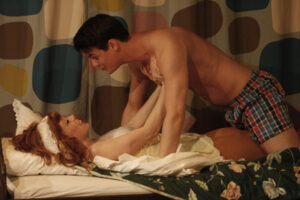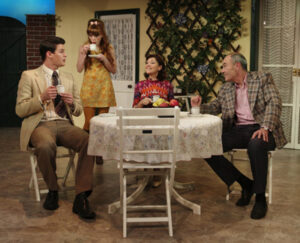By Uta Buhr

It is a great pleasure to see Alan Ayckbourn’s comedy “Relatively Speaking” again on the Mundsburg stage after a period of nearly fifteen years! As a matter of fact, the public loves this wonderful comedy best of all plays written by Britain’s most prolific playwright. What is its secret? In this play Ayckbourn reveals our human weakness when it comes to telling the truth in awkward situations. Be frank, dear reader, didn’t you ever tell your husband, wife, relatives or friends little white lies whenever you could avoid arguments? These lies – or shall we call them excuses – don’t hurt anybody. In our opinion it is more than justified to make use of them in the best possible way whenever harmony in relationships is at stake.
About the Play
The bed-sitter somewhere in London that Ayckbourn has chosen for his plot is badly furnished, curtains in the shrill colours of the mid-1960ies separating the “living-room” from kitchen and shower. However, Ginny and Greg, a young twenty-year old couple do not seem to mind their tacky environment. On the contrary, they are enjoying their independence in the wake of the year 1968 when Europe’s revolting youth turned the world upside down. Everything seems to be perfect on this morning up to the moment when a call on Ginny’s phone upsets Greg. Who is the caller hanging up when Greg asks him whom he wants to speak to. Did the caller really dial the wrong number, as Ginny pretends? And what about the many bunches of flowers being delivered to Ginny by a florist in London’s posh Westend, or the numerous chocolate boxes from an expensive confectionary? The most obscure object – a pair of oversized ugly brown slippers under Ginny’s bed – are even attributed to a very big dog who once wore them on its hind feet! Ginny, played by a gorgeous Welsh redhead named Charlotte Croft – is completely at a loss to answer Greg’s questions and takes recourse to a couple of very poultry lies. Or are they nothing more than those “little white lies” – as the British nicely call excuses that nobody hurt? The auditorium already suspects a secret lover of Ginny’s, whereas Greg, the man in love with Ginny, is only confused and determined to propose to Ginny after having asked her parents for her hand. What a blessing that Ginny is going to pay a visit to mummy and daddy in their cottage in Buckinghamshire (Bucks.) over the weekend. He even detects their address on a crushed cigarette box on the coffee table. Before calling a taxi, Greg puts the strange slippers into his bag.

Scene two introduces Philip and Sheila to us. This nice middle-aged couple lives in a big house in the lovely English countryside amidst trees, well-kept lawns and rose bushes. Philip, the incarnation of a man in his midlife crisis and Ginny’s boss, is in a bad mood and not willing to speak to Sheila who, on her part, is in high spirits on this sunny morning. By the way, we see James Walmsley in one of his best roles. When Greg arrives out of the blue, fate takes its course. He tells Sheila that he wants to marry her “daughter” Ginny. Sheila, a well brought up middle-class woman does not understand a word avoids to ask any questions. (Jan Hirst – great in the part of Sheila, the seemingly naïve home-maker!)
Philip too completely misunderstands Greg’s intention to marry his “daughter” and suggests instead that the young man wants to marry his wife Sheila. What a mess! This witty comedy of error gains momentum when Ginny finally turns up, determined to end her affair with Philip in order to be free for her attractive young lover Greg. By the way, Sheila is flabbergasted to learn that Ginny is Philip’s secretary. Did her husband not always refer to her as “old Miss what’s-her-name?” She had expected to meet an old maid with grey hair instead of a young beauty.
The ensuing hilarious “trials and tribulations” are brilliantly brought to life in this wonderful comedy which was originally titled “Meet my Father.” Although it is basically a play of misunderstandings und mistaken identity, as comedies of this genre go, the author has invented a well-constructed plot, plus some developed characters with a slightly dark streak. Values such as trust, honesty and commitment in relationships are the underlying themes of this play – values that are as challenging and relevant today as they ever were. Thus, “Relatively Speaking”, although written in the mid-sixties, is a modern play that will never lose its charm and will certainly always appeal to people with a sense of humour.
When the curtain fell, the four actors were greeted with a standing ovation by the audience. “Newcomer” Dale Monie as Greg – a promising young talent – completed the team of the three other actors whom we have already seen in other plays.
About the author: Alan Ayckbourn is perhaps the most prolific contemporary British playwright. A Londoner by birth, he has dedicated 54 years of his life to the theatre, writing and directing plays. His seventh play “Relatively Speaking” premiered in London in 1967 and quickly made him famous world-wide. Ayckbourn has received many distinguished awards throughout his brilliant career and was knighted by the Queen in 1997 for outstanding services to the theatre. This accolade can hardly be topped by any other prize.
Final performance of “Relatively Speaking” on February 8, 2014. Tickets under phone number 040 – 227 70 89, online booking under www.englishtheatre.de
Next premiere “Mass Appeal” by Bill C. Davis on February 20, 2014
Jack Lemmon once played the leading part in a Hollywood film of the same title.
